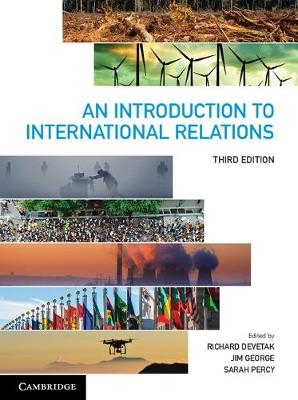
An Introduction to International Relations
Cambridge University Press (Verlag)
978-1-316-63155-3 (ISBN)
An Introduction to International Relations is a comprehensive introduction to the history, theories, developments and debates that shape the dynamic discipline of international relations and contemporary world politics. Bringing together an expert author team comprising leading academics from Australia and around the world, it allows readers to explore the discipline from both Australian and global perspectives. Known for its clear, easy-to-read style and relevant, real-world examples, the text has been fully updated and revised to reflect current research and the changing global political climate. This edition features extensive new material on: international history from World War I to World War II; international law; the globalisation of international society; and terrorism. A companion website for instructors offers additional case studies, critical thinking questions and links to relevant video and web materials that bring international relations theory to life.
Richard Devetak is Associate Professor in International Relations at the University of Queensland. He has published on the history of international thought, contemporary theoretical debates in international relations, humanitarian intervention, the 'war on terror', and globalisation's implications for justice and the state. His current research interests include: the history of international thought, history of the states-system, the laws of war and humanitarian intervention. He has held Visiting Fellowships at the Department of International Politics at University of Wales, Aberystwyth (2003), the Department of Politics, Institutions and History at University of Bologna (2008) and at the Department of Political and Social Sciences at the European University Institute, Florence (2012). Jim George taught international Relations and International Relations Theory for 25 years at the Australian National University before retiring in 2012. His most recent work is a book length study of the relationship between democratic politics and neo-liberal economics in a range of global sites (such as the US, India, post-Apartheid South Africa and post-Soviet Russia) Democracy and Globalization (2014) with S. Rosow. He is currently working on a book project concerned with the emergence/resurgence of far right ideas and political practices in Europe and Scandanavia in particular. Sarah Percy is Associate Professor in International Relations at the University of Queensland, where she is also Deputy Director of the Graduate Centre for International Policy and Governance. She was also Associate Professor in International Relations at the University of Western Australia. Before moving to Australia, she was University Lecturer in International Relations at the University of Oxford. Sarah Percy's research focuses on two main areas: the relationship between international law and international relations; and unconventional combatants, including mercenaries, pirates, and private military companies.
Introduction: The origins and changing agendas of international relations Richard Devetak; Part I. Theories of International Relations: 1. International relations theory in an era of critical diversity Jim George; 2. Liberalism Jim Richardson; 3. Realism Michele Chiaruzzi; 4. Marxism and critical theory Richard Devetak, Jim George and Martin Weber; 5. Feminism Katrina Lee Koo; 6. Postmodernism Roland Bleiker; 7. Constructivism Patrick Thaddeus Jackson and Joshua S. Jones; 8. Theories of global justice Richard Shapcott; Part II. International History: 9. From the Great War to the Second World War Louise Fawcett; 10. The Cold War and after Nick Bisley; Part III. The Traditional Agenda: States, War and Law: 11. The modern state and its origins Richard Devetak; 12. Nations and nationalism Gavin Mount; 13. Security Anthony Burke; 14. Arms control Marianne Hanson; 15. The causes of war Hidemi Suganami; 16. The changing character of warfare Robert Ayson; 17. The ethics and laws of war Alex J. Bellamy; 18. International law Sarah Percy; 19. The globalisation of international society Shogo Suzuki; 20. Diplomacy Paul Sharp and Geoffrey Wiseman; 21. Great powers Marco Cesa; Part IV. The New Agenda: Globalisation and Global Governance: 22. The United Nations Ian Hurd; 23. Non-state actors: multinational corporations and international non-governmental organisations James Goodman; 24. Religion and secularisation Elizabeth Shakman Hurd; 25. Global economic institutions Marc Williams; 26. Global trade and finance Maryanne Kelton and Leonard Seabrooke; 27. Global poverty and inequality Heloise Weber and Mark T. Berger; 28. Globalisation and its critics Steven Slaughter; 29. Terrorism Audrey Kurth Cronin; 30. Post-conflict state-building Beth Greener; 31. Humanitarianism and armed intervention Thomas G. Weiss; 32. Human rights Anthony Langlois; 33. Migration and refugees Sara E. Davies; 34. Global environmental politics Robyn Eckersley; 35. Climate change Peter Newell.
| Erscheinungsdatum | 30.11.2017 |
|---|---|
| Zusatzinfo | Worked examples or Exercises; 10 Tables, color; 27 Maps; 4 Halftones, color; 2 Line drawings, color |
| Verlagsort | Cambridge |
| Sprache | englisch |
| Maße | 192 x 255 mm |
| Gewicht | 1250 g |
| Themenwelt | Sozialwissenschaften ► Politik / Verwaltung ► Europäische / Internationale Politik |
| ISBN-10 | 1-316-63155-9 / 1316631559 |
| ISBN-13 | 978-1-316-63155-3 / 9781316631553 |
| Zustand | Neuware |
| Haben Sie eine Frage zum Produkt? |
aus dem Bereich


